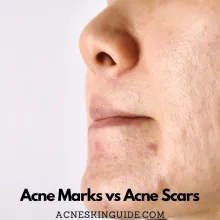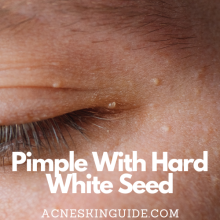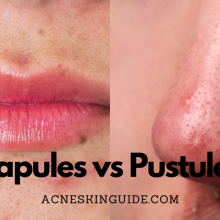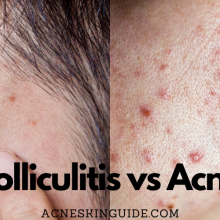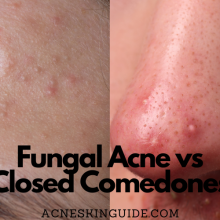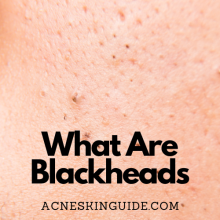Stress and Acne | Acne Skin Guide
The article explores the well-established link between stress and acne breakouts. It explains how stress triggers hormone imbalances like increased cortisol that overstimulate oil production, clog pores, and promote acne-causing inflammation and bacterial growth. Stress not only worsens existing acne but can also cause new breakouts, affecting different types including hormonal, adult, cystic, and jawline acne.
To combat stress-induced acne, the article recommends a multi-pronged approach combining relaxation practices (meditation, yoga), natural remedies (adaptogens, supplements), mind-body therapies, lifestyle changes (diet, sleep, exercise), and eliminating stressors. For severe cases, seeking professional dermatological treatment is advised. While managing stress isn’t a cure-all, the article positions it as a powerful tool when combined with consistent effort and medical options to achieve clearer skin.
#1 Recommended Acne Treatment | #2 Recommended Acne Treatment |
 |  |

The Link Between Stress and Acne
Acne is a common skin condition that affects millions of people worldwide, and its impact on self-esteem and quality of life can be significant. While there are many factors that contribute to the development of acne, one that is often overlooked is stress. Research has shown a strong connection between stress and acne, making stress management an essential part of any clear skin regimen.
Understanding the Stress-Acne Link
When we experience stress, our bodies release a hormone called cortisol, which can overstimulate oil glands and lead to increased sebum production. This excess oil can clog pores and create an ideal environment for acne-causing bacteria to thrive. Additionally, stress triggers inflammation in the body, which can further exacerbate acne breakouts.
Stress also disrupts the protective skin barrier, making it easier for acne-causing bacteria to penetrate the skin and cause infections. Furthermore, stress can lead to unhealthy habits like poor diet, lack of sleep, and increased alcohol consumption, all of which can contribute to acne flare-ups.
Types of Acne Affected by Stress
Stress can exacerbate various types of acne, including hormonal acne, adult acne, adolescent acne, cystic acne, and acne concentrated along the jawline and chin area. These stubborn stress breakouts are often difficult to treat with topical treatments alone, as they are rooted in internal factors.
Managing Stress for Clear Skin
To effectively manage stress and improve skin health, a multi-pronged approach is recommended. Here are some effective strategies:
- Mindfulness and Relaxation Techniques: Practices like meditation, yoga, deep breathing exercises, massage, and aromatherapy can help reduce stress levels and promote a sense of calm and relaxation.
- Natural Remedies: Incorporating adaptogenic herbs like ashwagandha and rhodiola into your routine can help the body better cope with stress. Supplements containing zinc, antioxidants, and probiotics can also support skin health and reduce inflammation.
- Mind-Body Techniques: Cognitive-behavioral therapy (CBT), hypnotherapy, and biofeedback can help manage stress by changing thought patterns and promoting relaxation.
- Lifestyle Changes: Getting enough sleep, maintaining a balanced diet rich in antioxidants and anti-inflammatory foods, regular exercise, practicing healthy coping mechanisms, and keeping a stress journal can significantly reduce stress levels.
Eliminating Stress Triggers
Identifying and eliminating sources of stress is crucial for managing acne. This may involve smart scheduling, setting boundaries, building a support system, and using non-comedogenic (non-pore-clogging) makeup and skincare products.
Seeking Professional Help
In cases of severe, cystic acne that doesn’t respond to stress management alone, it’s important to seek professional help from a dermatologist. They may prescribe medications like retinoids, antibiotics, or spironolactone to help control breakouts.
Success Stories and Testimonials
Many individuals have found success in clearing their stress-related acne by incorporating stress management techniques into their skincare routines. Hearing these inspiring stories can motivate others to remain consistent with their efforts.
Potential Downsides and Limitations
While managing stress can be an effective way to improve acne, it’s important to note that it may not work for everyone. Some individuals may require more intensive medical treatments or may have underlying hormonal imbalances or genetic factors contributing to their acne.
Additionally, some stress management techniques, such as certain supplements or mind-body therapies, may not be suitable for everyone or may have potential side effects or interactions with medications. It’s always best to consult with a healthcare professional before starting any new regimen.
Conclusion
The link between stress and acne is well-established, and effectively managing stress through a combination of relaxation techniques, lifestyle changes, and targeted treatments can be a powerful tool in the fight against acne. By prioritizing stress management and adopting a holistic approach, individuals can not only improve their skin health but also promote overall well-being. With patience and dedication, calming practices can lead to clearer, more radiant skin.
#1 Recommended Acne Treatment | #2 Recommended Acne Treatment |
 |  |
Summary and FAQs
Can stress cause new acne or only worsen existing acne?
Stress can both cause new acne breakouts and worsen existing acne. Here’s a more detailed explanation:
Causing New Acne:
Yes, stress can trigger new acne breakouts, even in people who don’t normally suffer from acne. When you’re under stress, your body increases its production of hormones like cortisol. This can overstimulate the oil glands, leading to excess sebum production and clogged pores – creating the ideal environment for new acne lesions to form.
Worsening Existing Acne:
At the same time, stress can also exacerbate existing acne conditions. The increase in inflammation due to stress can cause existing acne lesions to become more inflamed, red, and painful. Stress also weakens the skin’s barrier function, allowing more acne-causing bacteria to penetrate the skin and multiply.
So in summary, the hormonal changes, increased oil production, inflammation, and weakened skin barrier caused by stress create the perfect storm for both new breakouts to occur and pre-existing acne to flare up and worsen. Managing stress is therefore important for preventing new acne as well as keeping existing acne under better control.
How long does it take for stress management techniques to improve acne?
There is no definitive timeline for how long it takes for stress management techniques to improve acne, as it can vary from person to person. However, here are some general guidelines:
Short-Term Benefits (1-4 weeks):
Some people may start to see minor improvements in their acne within the first few weeks of consistently practicing stress relief methods like meditation, yoga, deep breathing exercises, etc. This is because these techniques can help lower cortisol and inflammation levels fairly quickly.
Moderate Improvements (1-3 months):
For most people, more noticeable improvements in acne may become apparent within 1-3 months of diligently managing stress through various relaxation practices combined with lifestyle changes like improved sleep, diet, and exercise routines. This allows time for the benefits of reduced stress to take effect on oil production and skin renewal cycles.
Significant Results (3-6 months):
Substantial clearing of stress-related acne often requires 3-6 months or more of committed stress management. This gives the body enough time to fully regulate hormone levels, calm systemic inflammation, and allow the skin’s microbiome and barrier to restore itself.
It’s important to be patient and consistent, as acne is a chronic condition. Results won’t be overnight. Sticking with a multi-pronged stress relief plan, while avoiding dietary and lifestyle triggers, is key for achieving lasting clear skin. Those with severe, cystic acne may need even more time combined with medical treatments. But reducing stress is an important complementary approach.
Are there specific foods or diets that can help reduce stress and acne?
Yes, there are specific foods and dietary patterns that can help reduce stress and acne. Here are some examples:
- Anti-inflammatory foods:
Consuming more anti-inflammatory foods like fatty fish (salmon, mackerel), nuts, seeds, olive oil, and fruits/vegetables rich in antioxidants can help reduce inflammation in the body, which is linked to both acne and stress. - Probiotic-rich foods:
Foods like yogurt, kefir, sauerkraut, and other fermented foods contain beneficial probiotics that can improve gut health. An unhealthy gut has been associated with increased inflammation and hormonal imbalances that trigger acne. - Zinc-rich foods:
Zinc is an important mineral for skin health and wound healing. Foods like oysters, beef, lamb, pumpkin seeds, cashews and spinach are good dietary sources of zinc that may help reduce acne. - High fiber foods:
Eating more high-fiber plant foods like vegetables, fruits, legumes and whole grains can help remove toxins and regulate hormone levels to prevent hormonal acne flare-ups. - Avoiding trigger foods:
On the other hand, limiting consumption of potential trigger foods like dairy, sugar, refined carbs and unhealthy fats may help reduce acne breakouts in some people.
Overall, an anti-inflammatory, antioxidant-rich, fiber-filled diet focused on whole, unprocessed foods is ideal for both acne and stress reduction. Proper hydration is also key. Making sustainable dietary changes can positively impact skin and mental health.
How does stress affect different age groups and their acne?
Stress can affect acne in different age groups in the following ways:
Teenagers/Adolescents:
- This age group is already dealing with hormonal fluctuations that increase oil production and acne risk.
- Stress from academic pressures, social anxiety, family issues etc. can further exacerbate breakouts.
- Stressed teens may develop coping habits like poor diet and lack of sleep that worsen acne.
Young Adults (20s-30s):
- Women’s acne may flare up due to stress from job demands, relationships, starting a family.
- Men under high stress produce more androgens that stimulate oil glands and acne.
- Stress-induced lack of sleep is a major acne trigger in this age bracket.
Adults (30s-50s):
- Persistent high-stress levels can cause hormonal imbalances and inflammation that provokes acne.
- Women going through perimenopause may experience acne due to fluctuating hormone levels exacerbated by stress.
- Stress can increase oil production and clogged pores in adult acne.
Older Adults (50+):
- Though less common, older adults can still get stress-related acne breakouts.
- Menopausal hormone changes combined with life stressors like empty nest, caregiving duties, etc. may cause acne flares.
- Increased inflammation from chronic stress impairs skin’s healing ability.
While stress affects all ages, it tends to be more problematic for acne during hormonally-driven adolescent years and for adult women. But managing stress is beneficial for preventing acne across all age groups and life stages.
Can stress management techniques be combined with medical acne treatments?
Yes, stress management techniques can absolutely be combined with medical acne treatments prescribed by a dermatologist. In fact, using both approaches together is often recommended for best results in managing acne.
Here are some key points about combining stress relief methods with medical acne therapies:
Complementary Approaches
Stress management techniques help address the internal causes of acne like hormonal imbalances and inflammation, while medical treatments tackle the external symptoms. These approaches work in a complementary manner for more comprehensive acne improvement.
Enhances Treatment Effectiveness
Reducing stress levels can help increase the efficacy of medical acne treatments. Lower stress promotes better skin healing and allows treatments like retinoids or antibiotics to work more optimally.
Prevents Treatment-Induced Flare-ups
Some acne medications can initially cause purging or flare-ups due to increased cell turnover. Managing stress minimizes inflammatory flare-ups that may be triggered by starting new treatments.
Improves Compliance and Results
Practicing relaxation methods may help patients stay consistent and compliant with their prescribed treatment plan, leading to better overall outcomes for clearing acne.
Addresses Long-Term Maintenance
While medications provide short-term acne reduction, stress management is a lifestyle approach that prevents recurring breakouts and promotes lasting clear skin.
The key is to work closely with your dermatologist when combining stress relief habits and prescribed medications/procedures to ensure there are no contraindications. But overall, this integrative mind-body approach is highly recommended for optimal acne management.

